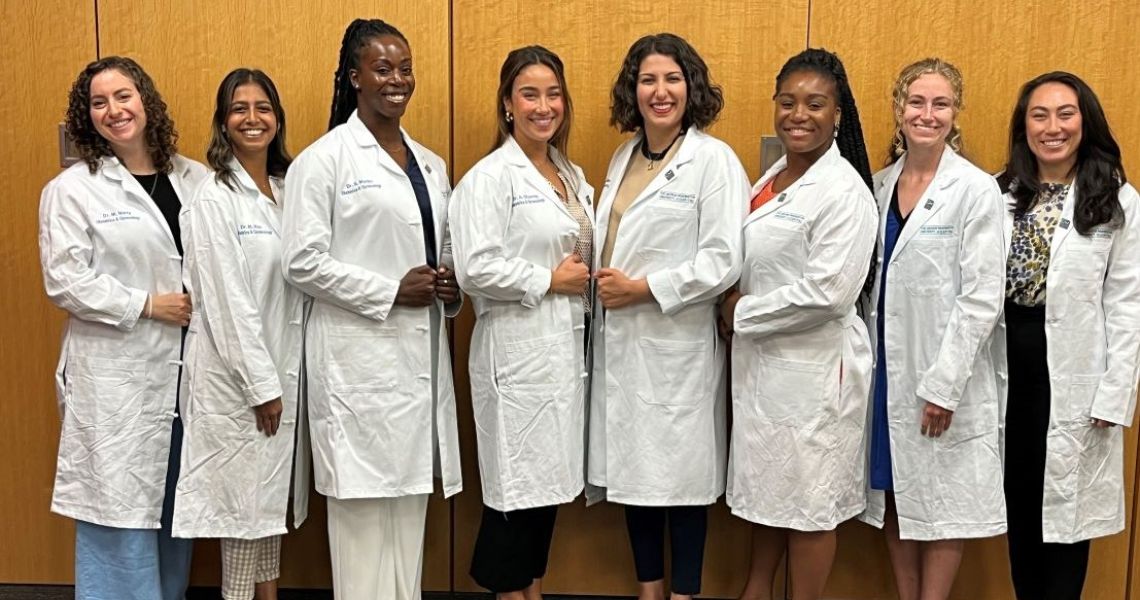
Intern Summer Camp
Upon arrival at GW new interns will have a multi-day orientation to the department and the specialty. You will participate in hands-on and didactic sessions that will give you the practical knowledge you need to start intern year. Sessions include suturing and knot tying, obstetric laceration repair, OR instrumentation, hysteroscopy, normal vaginal delivery, cesarean delivery, IUPC/IFE placement, amniotomy, electronic fetal monitoring and IUD insertion.
This is not only a great learning experience but an opportunity to form close bonds with your classmates!
Labor and Delivery (George Washington University)
All first year residents rotate on Labor and Delivery at GW from 7 am to 7 pm Monday - Friday. During this month the resident, together with a third year resident, an attending and a nurse midwife, are responsible for the care of all patients presenting to Labor and Delivery. The resident gains comfort with the evaluation and triage of patients, performing vaginal delivery and cesarean delivery, circumcision and other routine obstetric procedures.
OB Triage (George Washington University)
During this rotation, interns will be an integral part of the Labor and Delivery team managing a busy OB triage unit. They will gain experience with normal labor and SROM checks but also with higher risk patients. Interns work closely with the Chief Resident, Attending Obstetrician and Attending Nurse Midwife to ensure timely and appropriate triage of this diverse patient population. In addition, they will gain experience taking care of complicated post-partum patients and general management of the post-partum floor.
Maternal Fetal Medicine (George Washington University)
While on this rotation residents will participate in the care of both inpatient and outpatient high-risk patients. This resident is primarily responsible for any admitted high risk patients. During the day they will also see patients with one of the Maternal Fetal Medicine specialists in the outpatient setting and will gain exposure to management of common and uncommon complications of pregnancy. This resident will also participate in genetic counseling sessions and ultrasound sessions.
OB Night Float (George Washington University)
The resident spends one rotation managing Labor and Delivery with the assistance of a chief resident. This rotation allows the resident to begin to become comfortable with the basic management of laboring patients, triaging obstetric patients, managing postpartum complications and performing cesarean sections, vaginal deliveries and laceration repairs.
GYN Night Float (George Washington University)
The residents spends one rotation as the GYN on call resident at night. While on this rotation the resident will perform consults in the emergency department and gain experience with first trimester bleeding, management of fibroids, menorrhagia, pelvic pain and PID. The resident also may participate in triage and care of women in Labor and Delivery as needed. This resident will also gain exposure to the care of postpartum and postoperative patients.
Holy Cross Clinic
The residents spend 1-2 rotations at the ob/gyn clinic at Holy Cross Hospital. This clinic is primarily resident-run with supervision by the chief resident and an on-site dedicated faculty member. There is excellent autonomy and ownership of the patients in this educational setting. There are specialty clinics in high risk obstetrics, gynecology, colposcopy and urogynecology as well. This resident is also part of the post-partum rounding team and is expected to participate in the care of the postpartum patients, to learn circumcision skills and to manage postpartum complications. This resident takes call at Holy Cross Hospital.
Emergency Medicine
This one month rotation at The George Washington University involves working shifts in the Emergency Department alongside residents from emergency medicine, surgery, internal medicine and primary care. Throughout the rotation in the Emergency Department residents will have access to all patients who present this busy, level I trauma center. They will often be the first physicians evaluating these patients. The history and physical examinations on a variety of patients with all kinds of emergent and non-emergent conditions should become routine. Through the supervision of the senior residents, the attending physician and the teaching resident in emergency medicine, residents have the opportunity to discuss their evaluation techniques, specific historical or physical findings, and the thought process that goes into stabilizing and further assessing these patients. Residents should also become very comfortable in ordering appropriate laboratory and radiological examinations in an emergent setting when necessary.
Residents who are rotating through the Emergency Department will have the opportunity to work on many technical skills that are important to their residency such as placement of central lines, airway management, arterial blood gas collection, and other invasive maneuvers. In addition, they will perform many pelvic examinations that should add to their experience with obstetrics and gynecologic patients.
ICU
The resident spends one month learning inpatient care of critically ill patients while in the med/surg ICU at GW. The attending physicians are intensivists with backgrounds in surgery, anesthesia, pulmonary medicine and general medicine. Residents gain comfort in dealing with patients who require dialysis, ventilatory support, management of electrolyte and fluid abnormalities and other complicated medical care.
Ambulatory Experience
Each resident will spend ½ day per week during most rotations in the ambulatory setting. The ambulatory experience will be held at the GW Resident Clinic or the Holy Cross Resident Clinic depending on where they are rotating that block. Each resident will see a mix of obstetric and gynecologic patients with a variety of problems under the supervision of an attending physician.
The primary goal of this experience is for residents to learn ambulatory obstetrics and gynecology in a setting that encourages thorough patient counseling and partnering with patients to ensure quality care and education. Increasing responsibility throughout the four years of residency will be given to the resident under the supervision of a qualified, on-site, attending faculty member.